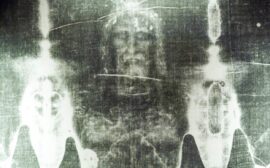 Have you ever noticed the attention Christmas gets and the lack of attention that Easter receives? One of the reasons behind this is due to the confrontational essence found in the doctrine of the atonement. For this doctrine, forces the individual to face his/her sin.
Have you ever noticed the attention Christmas gets and the lack of attention that Easter receives? One of the reasons behind this is due to the confrontational essence found in the doctrine of the atonement. For this doctrine, forces the individual to face his/her sin.
As the list of essential doctrines progresses, one will find that the core “existence of God, sinfulness of humanity, incarnation of Christ” lends itself to some of the other essential doctrines. In order to understand the atonement, one needs to first read the articles on the “existence of God,” “the sinfulness of humanity,” and the “incarnation of Christ.” Because those core doctrines are essential before understanding one of the doctrines that separates Christianity from every other world religion: the doctrine of the atonement.
What is the Doctrine?
The atonement is a theological term that represents Christ’s work of reconciliation between God and humanity through the work completed on the cross. There are a variety of viewpoints on the atonement. This writer holds to the “penal-substitution theory.” Millard Erickson writes of the theory, “By offering himself as a sacrifice, by substituting himself for us, actually bearing the punishment that should have been ours, Jesus appeased the Father and effected a reconciliation between God and humanity” (Erickson 1998, 833). While it is believed that this theory best holds to the teachings of Scripture, it is not the theory that is held as essential as much as the core of the doctrine of the atonement. There are two elements that comprise the doctrine of atonement:
Humanity is Unable to Save Itself
This doctrine is humbling. Quite frankly, it is the humility that is involved in the understanding that humankind cannot save itself that keeps some from coming to the cross. Humans are normally driven to be independent. Most people want to do for his/herself and does not desire to depend upon another person. The truth is, humans have far less control than they would wish. Granted, humans have progressed in technology. However, there are certain things that are beyond the scope of human control. When it comes to the keeping of God’s law (which would require a person to maintain perfection throughout one’s lifetime), this is one of those things that are beyond the scope of human grasp.
James writes, “For whoever keeps the whole law and yet stumbles at just one point is guilty of breaking all of it” (James 2:10). In other words, if a person commits one sin, the person has essentially broken the law and stands condemned. If you say, “Who could ever keep the law?” That’s just the point. No one can. This brings us to the second portion of the doctrine.
Christ was Perfect Sacrifice
The second element of the doctrine shows that Christ was the perfect sacrifice. Only God can save humanity. This is exactly what God sought to do. God did for humanity what humanity could not do for itself. God became a human and became the perfect sacrifice. In other words, God created a bridge that humanity could come to Him. This is why one must accept the deity of Jesus. Jesus was the sinless, perfect sacrifice. Peter writes, “For you know that it was not with perishable things such as silver or gold that you were redeemed from the empty way of life handed down to you from your ancestors, but with the precious blood of Christ, a lamb without blemish or defect. He was chosen before the creation of the world, but was revealed in these last times for your sake” (1 Peter 1:18-20). Jesus Himself said, “For God so loved the world that he gave his one and only Son, that whoever believes in him shall not perish but have eternal life. For God did not send his Son into the world to condemn the world, but to save the world through him. Whoever believes in him is not condemned, but whoever does not believe stands condemned already because they have not believed in the name of God’s one and only Son” (John 3:16-18).
Why Should the Doctrine Be Believed?
There are at least three reasons for believing this doctrine:
Sinlessness of Jesus
While it is impossible for one to prove that Jesus was sinless being 2,000 years removed, one can rely upon the testimony of those who knew Him best. Peter wrote, “To this you were called, because Christ suffered for you, leaving you an example, that you should follow in his steps. “He committed no sin, and no deceit was found in his mouth.” When they hurled their insults at him, he did not retaliate; when he suffered, he made no threats. Instead, he entrusted himself to him who judges justly. “He himself bore our sins” in his body on the cross, so that we might die to sins and live for righteousness; “by his wounds you have been healed” (1 Peter 2:21-24).
John wrote, “But you know that he appeared so that he might take away our sins. And in him is no sin” (1 John 3:5).
Paul, who had been an adversary of the faith, wrote, “God made him who had no sin to be sin for us, so that in him we might become the righteousness of God” (2 Corinthians 5:21). Ignatius of Antioch wrote around 110 AD, “God incarnate…God Himself appearing in the form of man,” Justin Martyr wrote in the early 100s, “Being the First-Begotten Word of God, is even God” (References from McDowell and McDowell 2010, 164). There is, in fact, no reason for one to believe that the early believers ever viewed Jesus as being anything but the sinless, incarnate Son of God.
Crucifixion of Jesus a Historical Certainty
The crucifixion is among one of the historical certainties of events in ancient antiquity. Let’s refer to Norman Geisler on this issue. Geisler writes,
“According to Julius Africanus (ca. 221), the first-century Samaritan-born historian, Thallus (ca. 52), “when discussing the darkness which fell upon the land during the crucifixion of Christ,” spoke of it as an eclipse (Bruce, 113, emphasis added). The second-century Greek writer, Lucian, speaks of Christ as “the man who was crucified in Palestine because he introduced a new cult into the world.” He calls him the “crucified sophist” (Geisler, 323). The “letter of Mara Bar-Serapion” (ca. a.d. 73), housed in the British Museum, speaks of Christ’s death, asking: “What advantage did the Jews gain from executing their wise King?” (Bruce, 114). Finally, there was the Roman writer, Phlegon, who spoke of Christ’s death and resurrection in his Chronicles, saying, “Jesus, while alive, was of no assistance to himself, but that he arose after death, and exhibited the marks of his punishment, and showed how his hands had been pierced by nails” (Phlegon, Chronicles, cited by Origen, 4:455). Phlegon even mentioned “the eclipse in the time of Tiberius Caesar, in whose reign Jesus appears to have been crucified, and the great earthquakes which then took place” (ibid., 445).
The earliest Christian writers after the time of Christ affirmed his death on the cross by crucifixion. Polycarp, a disciple of the apostle John, repeatedly affirmed the death of Christ, speaking, for example, of “our Lord Jesus Christ, who for our sins suffered even unto death” (Polycarp, 33). Ignatius (30–107), a friend of Polycarp, wrote, “And he really suffered and died, and rose again.” Otherwise, he adds, all his apostles who suffered for this belief, died in vain. “But, (in truth) none of these sufferings were in vain; for the Lord was really crucified by the ungodly” (Ignatius, 107). In Dialogue with Trypho the Jew, Justin Martyr noted that Jews of his day believed that “Jesus [was] a Galilean deceiver, whom we crucified” (Martyr, 253).
This unbroken testimony from the Old Testament to the early Church Fathers, including believer and unbeliever, Jew and Gentile, is overwhelming evidence that Jesus suffered and died on the cross” (Geisler 1999, 128).
Old Testament Prophecies
The Old Testament (or Hebrew Bible) holds countless prophecies pointing to what one should expect by the Messiah. Josh and Sean McDowell write, “…in one day…no fewer than 29 specific prophecies spoken at least 500 years earlier” (McDowell and McDowell 2010, 195) were fulfilled. They go on to write, “Professor Peter W. Stoner, in an analysis that was carefully reviewed and pronounced to be sound by the American Scientific Affiliation, states that the probability of just eight prophecies being fulfilled in one person is 1 in 100,000,000,000,000,000″ (McDowell and McDowell 2010, 197). That Jesus was the perfect sacrifice as identified by the Hebrew Bible is, in this writer’s opinion, undeniable.
Why is the Doctrine Essential?
This doctrine is essential for one to become, or be considered, a Christian because this is the crux of the Christian faith. There is a reason why the cross, an instrument of death, became the symbol for the Christian faith. For it was by Jesus’ sacrifice on the cross that individuals have access to the God of eternity. Some would like to think that they can be good enough to earn God’s approval. The problem is that none of us can ever be good enough to equate with the holiness and perfection of God. Forgiveness is needed. Mercy needs to be bestowed. It can only be by God that such forgiveness and mercy can be extended. If Jesus is who the New Testament purports Him to be, then it is by the perfect sacrifice freely offered by Jesus that one can be saved. No one can be a Christian without first confronting the cross.
NOTE: Would you like to cross the bridge to God? Would you like to have your sins forgiven? See the link “How to Know Jesus” on the upper-right side of the website to know how.
Bibliography
All Scripture, unless otherwise noted, comes from The New International Version. Grand Rapids: Zondervan, 2011.
Erickson, Millard J. Christian Theology, 2nd Ed. Grand Rapids: Baker Academic, 1998.
Geisler, Norman L. Baker Encyclopedia of Christian Apologetics, Baker Reference Library. Grand Rapids, MI: Baker Books, 1999.
McDowell, Josh, and Sean McDowell. The Unshakable Truth: How You Can Experience the 12 Essentials of a Relevant Faith. Eugene: Harvest House, 2010.
Stoner, Peter W., and Robert C. Newman. Science Speaks. Chicago: Moody Press, 1976.
The New International Version (Grand Rapids, MI: Zondervan, 2011),





